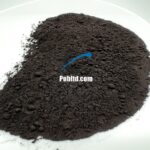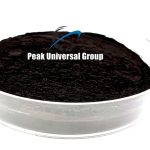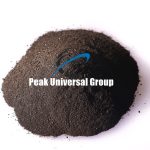
What Is Gilsonite Used For?
Gilsonite is a black, hard, and brittle resin that occurs naturally as asphalt complexes in the border regions of Iran and Iraq. It is primarily composed of NSO compounds with some saturated and aromatic hydrocarbons. Gilsonite powder is commonly used as an additive in drilling muds, but it also finds applications in asphalt paving, roofing and construction paper, paint, ink, explosives, carbon electrodes, and various fuels.
At the surface, Gilsonite ore dike range in thickness from several millimeters to over 5 meters, with some exposed for up to 39 kilometers, although most are less than 5 kilometers long. These dikes cut across various lower Eocene to Oligocene extension fractures caused by local overpressure in oil shale.
What Is Industrial Applications of Gilsonite?
Gilsonite, also known as natural asphalt, uintaite, or asphaltite, is a naturally occurring, brittle, black hydrocarbon. Unlike petroleum-derived bitumen, Gilsonite is mined in solid form and requires minimal processing.
Thanks to its unique properties—high softening point, excellent bonding ability, and solubility in hydrocarbon solvents—Gilsonite has found wide applications in industrial sectors.
⚙️ Main Industrial Applications of Gilsonite
Oil & Gas Industry Applications
Gilsonite is a valued additive in drilling muds and oil well cementing formulations. It enhances filtration control, strengthens boreholes, and reduces fluid loss under high temperature and pressure conditions.
✅ Benefits:
-
Stabilizes shale formations
-
Improves wellbore integrity
-
Reduces differential sticking
Drilling Fluids
Gilsonite is used in oil-based drilling muds to:
-
Control fluid loss
-
Stabilize shale formations
-
Reduce differential sticking
Well Cementing
-
Improves gas migration control
-
Reduces slurry density
-
Enhances zonal isolation
Lost Circulation Material (LCM)
Gilsonite’s particle structure is effective in sealing fractures and porous formations during drilling.
Asphalt and Road Construction
When blended with asphalt, Gilsonite boosts road surface durability, strength, and waterproofing. It acts as a performance-enhancing binder that resists deformation and weather-related damage.
✅ Applications:
-
Hot Mix Asphalt (HMA)
-
Modified bitumen membranes
-
Crack sealing and patching
Asphalt Modifier
When added to hot mix asphalt, Natural Bitumen:
-
Increases durability and resistance to rutting
-
Enhances oxidation resistance and waterproofing
-
Extends pavement life in high-load traffic areas
Used in:
-
Highways
-
Runways
-
Industrial roads
Paints, Inks, and Industrial Coatings
Gilsonite is a preferred additive in solvent-based paints, industrial coatings, and printing inks due to its natural gloss, excellent pigment dispersion, and quick drying time.
✅ Benefits:
-
Improves adhesion and viscosity
-
Enhances weather and UV resistance
-
Reduces manufacturing costs
Black Ink Resin
Gilsonite is commonly used in:
-
Printing inks for newspapers and packaging
-
Industrial paints and pipe coatings
Benefits:
-
Adds gloss
-
Improves hardness
-
Increases chemical resistance
Sealants and Adhesives
With its waterproofing properties and strong bonding capabilities, Gilsonite is ideal for industrial adhesives, sealants, and roofing compounds.
✅ Applications:
-
Expansion joint fillers
-
Roofing sealants
-
Bitumen tapes
Gilsonite enhances:
-
Bonding strength in adhesives
-
Thermal resistance in sealants
-
Waterproofing in construction products
Foundry & Metallurgy
In foundry applications, Gilsonite serves as a carbon additive and binder. It helps produce cleaner castings with smoother surfaces.
✅ Uses:
-
Green sand molds
-
Steel desulfurization
-
Graphite substitute
In the foundry industry, Gilsonite:
-
Acts as a carbon additive
-
Reduces gas defects in casting
-
Enhances surface finish and mold integrity
Natural Bitumen is also used in drilling fluid manufacturing, which acts as a shale inhibitor in drilling fluid and reacts with shale to prevent sloughing and swelling. Natural Bitumen has different analyses and specifications since it is a mineral coming from a mine, like other minerals, and is used in more than 160 products, primarily in dark-colored printing inks and paints, oil well drilling muds and cement, asphalt modifiers, foundry sands additives, and a wide variety of chemical products.
Natural Bitumen is compatible with coating materials, petroleum resin and oil, pitch and bitumen mixtures, vegetable oil, and can reduce the cost of materials. It is also homologous with most materials used in the paint, varnish, primer, mastic, enamel, and enamel industry, while also being highly resistant to acid and alkali materials.
Overall, Gilsonite’s versatility and unique properties make it a valuable material in a wide range of industries, contributing to the quality and performance of various products and processes.
📊 Gilsonite Applications and Benefits
| Industry | Application | Key Benefits |
|---|---|---|
| Oil & Gas | Drilling mud, cementing | Fluid loss control, shale stability |
| Asphalt & Roads | Binder modifier, paving mix | Durability, waterproofing |
| Coatings & Paints | Ink and paint additive | Gloss, adhesion, fast drying |
| Foundry & Steel | Mold additive, carbon source | Clean castings, reduced defects |
| Sealants & Adhesives | Roofing, waterproofing compounds | Strong adhesion, chemical resistance |
Advantages of Natural Bitumen
Natural Bitumen is a naturally occurring hydrocarbon resin with unique properties that make it a valuable material in various industries. Here’s a description of its uses based on its properties:
-
- Readily Soluble: Gilsonite is readily soluble in aromatic solvents and most chlorinated solvents, making it an ideal material for use in paints, coatings, and adhesives.
- High Asphaltene Content: Gilsonite has a high asphaltene content, which makes it an excellent additive in asphalt and bitumen production. It improves the durability and performance of asphalt mixes.
High Solubility
Natural Bitumen has high solubility in organic solvents, making it suitable for use in the ink, paint and adhesive industries.
High Purity and Consistent Properties:
Gilsonite is known for its high purity and consistent properties, making it a reliable material for various applications.
High Molecular Weight:
Gilsonite has a high molecular weight, which makes it a suitable material for use in the production of high-performance adhesives, coatings, and sealants.
High in Resin and Nitrogen Content:
Natural Bitumen is high in resin and nitrogen content, making it a valuable material for use in the production of adhesives, coatings, and sealants.
Overall, Gilsonite’s unique properties make it a versatile material that finds applications in various industries, including paints, coatings, adhesives, and asphalt production.
Peak Universal Business: Your Trusted Gilsonite Supplier in UAE
Peak Universal Business Ltd is a Natural Bitumen rock mine owner and manufacturer of lump and powder in various grain sizes, in both powder and raw lump forms. Its applications include Fluid Loss Control Additives (FLC) in oil well drilling muds and filtrate control as a hole stabilizer for high-temperature, high-pressure oil wells (HTHP, HTLP), and as a bitumen modifier to mix with asphalt to improve performance and stability. Gilsonite is also a leading material used in roof coating, building product coating, and road seal coat crack sealer.
As a reputable supplier in the industry, Peak Universal Business offers a comprehensive range of Gilsonite products tailored to meet the diverse needs of customers across different sectors. With a commitment to quality, reliability, and customer satisfaction,
Peak Universal Business prides itself on delivering superior Gilsonite materials backed by exceptional service and expertise.
❓ Frequently Asked Questions
❓ Is Gilsonite the same as bitumen?
No. Gilsonite is a naturally occurring hard resin, while bitumen is a petroleum refinery byproduct. Gilsonite offers superior performance in high-temp and chemical-resistant applications.
❓ Why is Gilsonite used in oil drilling?
Gilsonite improves the integrity of drilling fluids, reduces mud loss, and protects wellbores in high-pressure environments.
❓ Can Gilsonite be used in road construction?
Yes, Gilsonite-modified asphalt extends road life by increasing rut resistance, elasticity, and water repellency.
❓ Is Gilsonite environmentally safe?
Gilsonite is naturally occurring and non-toxic, making it safer than many synthetic alternatives in industrial formulations.
🏁 Conclusion
Gilsonite is an indispensable material across multiple industries due to its superior binding, waterproofing, and thermal resistance properties. Whether in drilling fluids, asphalt roads, protective coatings, or foundry processes, Gilsonite enhances product performance and durability — all while offering a natural, sustainable solution.
You can Read More about Gilsonite Here:
Difference between Bitumen and Natural Bitumen
What is gilsonite used for in drilling?
What is gilsonite used for in drilling?
Drilling Mud and Its Importance
What is Drilling Mud and Why is it Important?
Natural Bitumen: Its Uses, Applications
📣Call to Peak Universal Business
🔍Looking for high-quality Gilsonite tailored to your industry needs?
Partner with Peak Universal Business Ltd. to source custom-graded Gilsonite for oilfield, construction, coatings, or foundry applications.
📞 Get in touch today for expert consultation, technical data sheets, or bulk supply options. Let’s build industrial strength — naturally.
📧 Email: [email protected]
📞 Phone: +971 4 878 2031
🌐 Visit: https://publtd.com/
📧 Contact us now for a quote, MSDS, or technical guidance: If You have any other Query or Question you want to ask, Please don’t hesitate to Contact Us.
- 0 comment





Leave a Reply